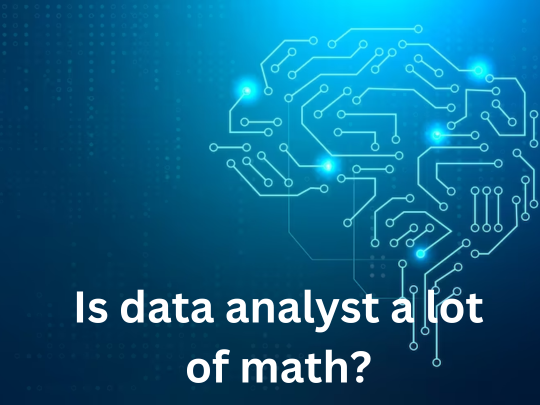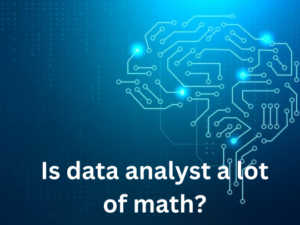Yes, data analysis does involve a significant amount of math. Below are some subheadings to provide a more detailed explanation:
Learn the core concepts of Data Analytics Course video on Youtube:
Wish to pursue a career in data analytics? Enroll in this best data analytics courses to start your journey.
Statistics:
Data analysts must have a strong understanding of statistical concepts such as probability, hypothesis testing, regression analysis, and correlation. These concepts allow analysts to draw meaningful insights and conclusions from data.
Algebra:
Algebra is used in data analysis for various tasks such as data manipulation, formula construction, and equation solving. An understanding of algebraic concepts is essential for data analysts to perform their job effectively.
Kickstart your career by enrolling in this data analytics courses in Bangalore fees.
Calculus:
Calculus is used in data analysis for tasks such as optimization, prediction, and modeling. Knowledge of calculus concepts such as derivatives and integrals is necessary for data analysts to work with complex data sets.
Programming:
Data analysts need to have a strong grasp of programming languages such as Python, R, and SQL. Understanding programming concepts such as loops, functions, and conditional statements enables analysts to automate tasks and extract insights from data more efficiently.
Pursue a career in Data Analytics with the number one training institute 360DigiTMG. Enroll in the data analyst training and placement in Hyderabad to start your journey.
Data Visualization:
Data analysts must have the ability to visually represent data in a clear and concise manner. This involves using graphical tools and techniques such as charts, graphs, and infographics.
Data Cleaning:
Data analysts often spend a significant amount of time cleaning and preparing data for analysis. This involves identifying and correcting errors, removing duplicates, and dealing with missing values. Basic math skills such as arithmetic and logical operations are necessary for data cleaning tasks.
Don’t delay your career growth, kickstart your career by enrolling in this data analyst training in Chennai with 360DigiTMG Data Analytics course.
Machine Learning:
Machine learning algorithms are used by data analysts to create predictive models and perform tasks such as classification and clustering. These algorithms rely heavily on math concepts such as linear algebra, matrix operations, and probability distributions.
Time-Series Analysis:
Time-series analysis involves analyzing data that changes over time, such as stock prices or weather data. Understanding mathematical concepts such as time-series decomposition, moving averages, and autoregressive models is essential for time-series analysis.
Optimization:
Optimization techniques are used to find the best solution to a problem by minimizing or maximizing an objective function. Data analysts use optimization techniques to solve problems such as resource allocation, scheduling, and logistics. Understanding concepts such as linear programming, nonlinear programming, and convex optimization is necessary for optimization tasks.
Looking forward to becoming a Data Analyst? Check out the data analyst course institute in Pune and get certified today.
Regression Analysis:
Regression analysis is a statistical technique used to determine the relationship between two or more variables. Data analysts use regression analysis to model the relationship between independent and dependent variables and make predictions. Knowledge of concepts such as linear regression, logistic regression, and multiple regression is necessary for regression analysis.
Probability Theory:
Probability theory is a branch of mathematics that deals with the likelihood of events occurring. Data analysts use probability theory to make informed decisions and draw inferences from data. An understanding of concepts such as probability distributions, Bayes’ theorem, and random variables is necessary for probability theory.
Sampling Techniques:
Sampling techniques are used to select a subset of data from a larger population for analysis. Data analysts must have a strong understanding of sampling techniques such as simple random sampling, stratified sampling, and cluster sampling to ensure that their analysis is representative of the population.
Data Mining:
Data mining involves using statistical and machine learning techniques to discover patterns and relationships in large data sets. Data analysts use data mining to identify trends, associations, and anomalies in data. An understanding of concepts such as association rule mining, clustering, and decision trees is necessary for data mining.
Data Modeling:
Data modeling involves creating a representation of data using mathematical and statistical techniques. Data analysts use data modeling to create predictive models and analyze the behavior of complex systems. Knowledge of concepts such as regression models, time-series models, and Bayesian networks is necessary for data modeling.
Hypothesis Testing:
Hypothesis testing is a statistical method used to determine whether an assumption made about a population is true or false. Data analysts use hypothesis testing to validate assumptions, make inferences about populations, and test the significance of results. Understanding concepts such as null and alternative hypotheses, p-values, and confidence intervals is necessary for hypothesis testing.
Descriptive Statistics:
Descriptive statistics are used to summarize and describe the main characteristics of a data set. Data analysts use descriptive statistics to calculate measures such as the mean, median, mode, and standard deviation. Understanding these statistical measures is necessary for descriptive statistics.
Inferential Statistics:
Inferential statistics are used to make inferences about a population based on a sample of data. Data analysts use inferential statistics to estimate population parameters, test hypotheses, and make predictions. Knowledge of concepts such as sampling distribution, central limit theorem, and hypothesis testing is necessary for inferential statistics.
Geographic Information Systems (GIS):
GIS is a system that captures, analyzes, and displays geographic data. Data analysts use GIS to map and analyze spatial data, such as population density, land use, and environmental factors. Understanding concepts such as spatial analysis, network analysis, and geostatistics is necessary for GIS.
Experimental Design:
Experimental design is the process of planning and conducting experiments to test a hypothesis. Data analysts use experimental design to control for confounding variables and establish causality. Knowledge of concepts such as independent and dependent variables, control groups, and randomization is necessary for experimental design.
Data Science Placement Success Story
Financial Analysis:
Financial analysis involves using mathematical and statistical techniques to analyze financial data, such as stock prices, balance sheets, and income statements. Data analysts use financial analysis to make investment decisions, evaluate company performance, and assess risk. Understanding concepts such as financial ratios, time value of money, and capital budgeting is necessary for financial analysis.
Data Science Training Institutes in Other Locations
Tirunelveli, Kothrud, Ahmedabad, Hebbal, Chengalpattu, Borivali, Udaipur, Trichur, Tiruchchirappalli, Srinagar, Ludhiana, Shimoga, Shimla, Siliguri, Rourkela, Roorkee, Pondicherry, Rajkot, Ranchi, Rohtak, Pimpri, Moradabad, Mohali, Meerut, Madurai, Kolhapur, Khammam, Jodhpur, Jamshedpur, Jammu, Jalandhar, Jabalpur, Gandhinagar, Ghaziabad, Gorakhpur, Gwalior, Ernakulam, Erode, Durgapur, Dombivli, Dehradun, Cochin, Bhubaneswar, Bhopal, Anantapur, Anand, Amritsar, Agra , Kharadi, Calicut, Yelahanka, Salem, Thane, Andhra Pradesh, Greater Warangal, Kompally, Mumbai, Anna Nagar, ECIL, Guduvanchery, Kalaburagi, Porur, Chromepet, Kochi, Kolkata, Indore, Navi Mumbai, Raipur, Coimbatore, Bhilai, Dilsukhnagar, Thoraipakkam, Uppal, Vijayawada, Vizag, Gurgaon, Bangalore, Surat, Kanpur, Chennai, Aurangabad, Hoodi,Noida, Trichy, Mangalore, Mysore, Delhi NCR, Chandigarh, Guwahati, Guntur, Varanasi, Faridabad, Thiruvananthapuram, Nashik, Patna, Lucknow, Nagpur, Vadodara, Jaipur, Hyderabad, Pune, Kalyan.
Data Analyst Courses In Other Locations
Tirunelveli, Kothrud, Ahmedabad, Chengalpattu, Borivali, Udaipur, Trichur, Tiruchchirappalli, Srinagar, Ludhiana, Shimoga, Shimla, Siliguri, Rourkela, Roorkee, Pondicherry, Rohtak, Ranchi, Rajkot, Pimpri, Moradabad, Mohali, Meerut, Madurai, Kolhapur, Khammam, Jodhpur, Jamshedpur, Jammu, Jalandhar, Jabalpur, Gwalior, Gorakhpur, Ghaziabad, Gandhinagar, Erode, Ernakulam, Durgapur, Dombivli, Dehradun, Bhubaneswar, Cochin, Bhopal, Anantapur, Anand, Amritsar, Agra, Kharadi, Calicut, Yelahanka, Salem, Thane, Andhra Pradesh, Warangal, Kompally, Mumbai, Anna Nagar, Dilsukhnagar, ECIL, Chromepet, Thoraipakkam, Uppal, Bhilai, Guduvanchery, Indore, Kalaburagi, Kochi, Navi Mumbai, Porur, Raipur, Vijayawada, Vizag, Surat, Kanpur, Aurangabad, Trichy, Mangalore, Mysore, Chandigarh, Guwahati, Guntur, Varanasi, Faridabad, Thiruvananthapuram, Nashik, Patna, Lucknow, Nagpur, Vadodara, Jaipur, Hyderabad, Pune, Kalyan, Delhi, Kolkata, Noida, Chennai, Bangalore, Gurgaon, Coimbatore.
Navigate To:
360DigiTMG – Data Analytics, Data Analyst Course Training in Bangalore
#62/1, Ground Floor, 1st Cross, 2nd Main, Ganganagar 560032, Bangalore, Karnataka
Phone: 1800-212-654321
Email: enquiry@360digitmg.com
Get Direction: data science courses in bangalore


